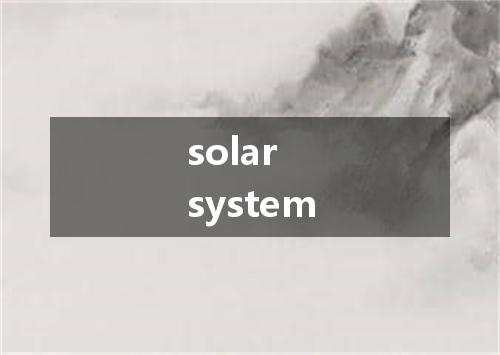solar system
推荐文章

n.
太阳系;
变形
复数:solar systems
英英释义
solar system
n.the sun with the celestial bodies that revolve around it in its gravitational field
双语例句
The solar system was formed 4.5 billion years ago.
太阳系是四十五亿年前形成的。
权威例句
Dusty plasmas in the solar systemMeteorites and the early solar system
Chaos and Stability of the Solar System
Solar System Abundances and Condensation Temperatures of the Elements
The Solar System: Records from t ge 0: Meteorites and the Early Solar System
Radiation forces on small particles in the solar system ☆
Cratering Records in the Inner Solar System in Relation to the Lunar Reference System
Chaotic capture of Jupiter's Trojan asteroids in the early Solar System.
Origin of the orbital architecture of the giant planets of the Solar System.
Nucleosynthesis in Asymptotic Giant Branch Stars: Relevance for Galactic Enrichment and Solar System Formation
1. Second, Jupiter's enormous mass prevents most Sun-bound comets from penetrating the inner solar system.
其次,木星的巨大质量阻止了大多数与太阳结合的彗星穿透太阳系内部。
youdao
2. Jupiter, Saturn, Uranus, and Neptune. Those are the gas giants, the four heavyweights of the solar system. But was there once a fifth?
木星、土星、天王星和海王星。这些都是气体行星,是太阳系的四个重量级。但曾经存在第五个行星吗?
youdao
3. An estimated 99.85 percent of the mass of our solar system is contained within the Sun, while the planets collectively make up most of the remaining 0.15 percent.
太阳占据了太阳系总质量的大约99.85%,而在剩余的0.15%中,行星占据了大部分。
youdao
4. Saturn is the second biggest planet in the solar system.
土星是太阳系的第二大的行星。
《柯林斯英汉双解大词典》
5. The picture shows six of the nine planets in the solar system.
这张图片展示太阳系9个行星中的6个行星。
《柯林斯英汉双解大词典》
6. The spacecraft will enable scientists to study some dark corners of the solar system.
太空船使得科学家可以研究太阳系中一些不为人知的角落。
《柯林斯英汉双解大词典》
7. If the solar system has an underachiever, it has to be Venus.
如果太阳系有一个后进生,那一定是金星。
youdao
8. They're basically made up of debris left over from the origin of the solar system.
它们基本上是由太阳系起源时遗留下来的碎片组成的。
youdao
9. The Moon's spin and tilt are unique among other planetary bodies in the solar system.
月球的自转和倾斜在太阳系的其他行星体中是独一无二的。
youdao
10. Why do scientists think something could be hidden beyond the edge of our solar system?
为什么科学家认为某些东西可能隐藏在我们太阳系的边缘之外?
youdao
11. The solar system also has two analogous classes of objects, smaller than planets—namely, asteroids and comets.
太阳系也有两类类似的物体,比行星还小——即小行星和彗星。
youdao
12. For more than 300 years, we thought Saturn was the only body in the solar system with rings.
在300多年的时间里,我们一直认为土星是太阳系唯一拥有光环的天体。
youdao
13. That makes it the biggest known crater in our solar system and it may well be the oldest.
这使它成为太阳系中已知最大的陨石坑,也可能是最古老的陨石坑。
youdao
14. Other planets in our solar system lack the oxygen atmosphere that helps explain why life exists on Earth.
我们太阳系的其他行星缺乏氧气大气层,这有助于解释为什么地球上存在生命。
youdao
15. In Astronomy, for example, the distinction between the solar system and the universe wasn't clear until modern times.
例如,在天文学中,太阳系和宇宙两者的区别直到现代才被弄清楚。
youdao
16. They will serve as modern Magellans, mapping out the solar system for whatever explorers follow, whether man or machine.
他们将作为现代麦哲伦人,绘制出太阳系的蓝图,无论探险者是人类还是机器。
youdao
17. This transformed our view not only of the solar system but also of the importance of sending a spacecraft to Pluto.
这不仅改变了我们对太阳系的认识,也使我们意识到向冥王星发射飞船的重要性。
youdao
18. The ancient Greeks believed that what we called the solar system was in fact the entire universe, and that the universe was geocentric.
古希腊人坚信,我们所谓的太阳系实际上就是整个宇宙,并且宇宙以地球为中心。
youdao
19. I wanna go over the different types of meteorites, and what we've learned from them about the formation of Earth, and the solar system.
我将介绍陨石的不同类型,以及我们能够从中了解到的有关地球和太阳系的形成的知识。
youdao
20. The nearly circular orbits of planets in our solar system led scientists to expect that planets around other stars would also reside in circular orbits.
在我们的太阳系中,行星的轨道几乎是圆形的,这使得科学家们预测,其他恒星周围的行星也会位于圆形轨道上。
youdao
21. The surface of Mars shows a wide range of geologic features, including huge volcanoes—the largest known in the solar system—and extensive impact cratering.
火星表面显示出广泛的地质特征,包括巨大的火山——太阳系中已知的最大的火山——和广阔的撞击坑。
youdao
22. Of course, we now know that the planets, including Earth, revolve around the Sun, and that the solar system is only a tiny part of the universe.
当然,我们现在知道,包括地球在内的行星都围绕太阳公转,而太阳系只是宇宙的一小部分。
youdao
23. Instead of normal planets whose composition could be predicted by theory, the planets populating our solar system are unique individuals whose chemical and tectonic identities were create.
我们的太阳系中的行星不是那些可以通过理论预测其组成的普通行星,而是独特的个体,它们的化学和构造特征都是由它们创造的。
youdao
24. The orderly nature of our solar system leads most astronomers to conclude that the planets formed at essentially the same time and from the same material as the Sun.
我们太阳系的有序特性使大多数天文学家得出结论,这些行星基本上在同一时间形成,且物质来源和太阳的一样。
youdao
25. Complex life evolved on the Earth's surface, but not on Mars or other planets in the solar system because on those planets, early surface life was killed by UV radiation.
复杂的生命在地球表面进化,而不是在火星或太阳系的其他行星上,因为在那些行星上,早期的地表生命被紫外线杀死了。
youdao
26. Paradoxically, while the temperatures required for liquid water exist only in the inner solar system, the key building blocks of life, including water itself, occur primarily beyond the asteroid belt.
矛盾的是,虽然液态水所需的温度只存在于太阳系内部,但生命的关键组成部分,包括水本身,却主要存在于小行星带之外。
youdao
27. Far from the sun, in the outer solar system, beyond Jupiter's orbit, temperatures are low enough to permit ices to form out of water and out of gases like methane and carbon dioxide.
在远离太阳的外太阳系,在木星轨道之外,温度低到足以使冰从水以及甲烷和二氧化碳等气体中形成。
youdao
28. The absence of an oxygen atmosphere on Mars and other planets in our solar system means that these planets also lack an ozone shield that would protect surface-dwelling life from UV radiation.
在火星和我们太阳系的其他行星上没有氧气,这意味着这些行星也缺乏保护地表生物免受紫外线辐射的臭氧层。
youdao
29. If we want to survive as a species, we have to expand into the solar system and likely beyond.
如果我们希望作为一个物种生存下去,就必须扩张到太阳系之中或超越太阳系。
youdao
30. Our planet Earth, together with other planets, revolve around our Sun in what is called our Solar system.
我们的行星地球,连同其他行星,围绕我们的太阳旋转,这就是我们的太阳系。
youdao
